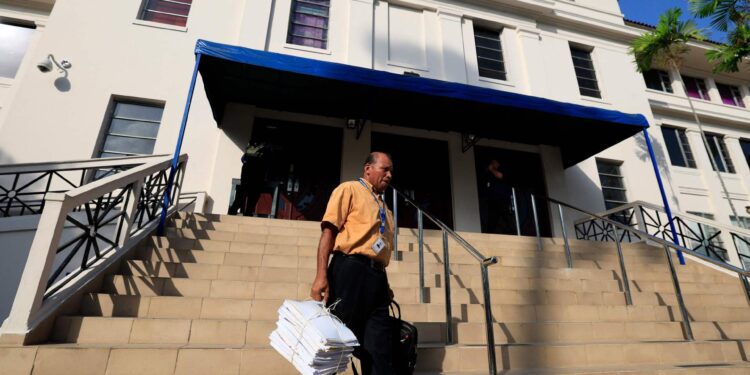In the spring of 2016, people around the world overnight began looking for their names among millions of documents published by the German newspaper “Tsud Duetsche Zeitung” in a leak that is the largest in the world on corruption issues suspected of hundreds of individuals in about 200 countries, including heads of state, officials, businessmen and celebrities.
While people were living their lives, Panama became more famous of fire on knowledge, and the documents that were attributed to them became the subject of everyone’s talk around the world, whoever did not get involved in it was looking for names that he might know from his government officials or businessmen in his country or even his favorite viewers, and the curtain at the time revealed the fact that involvement in corruption does not know a profession, status, wealth, and that the investigation of it and its control is a global responsibility.
How did the story start?
In 2015, an unknown person called himself “John de” in the newspaper “Tsmsche Zeitung” and offered them to leak more than 2 terabytes of sensitive files dating back to 1977 to December 2015, without any charge.
The German newspaper obtained about 11 million documents it investigated in cooperation with the International Federation of Investigative Journalists from the law firm “Musak Fonseca”, which was based in Panama, and called it “Panama’s documents”.
The documents revealed a network of about 200,000 tax haven in more than 200 countries around the world, and included financial information for a number of leaders of countries at the time, and hundreds of government officials, businessmen and celebrities around the world.
After a year of research, investigation and arrangement of information, the documents were published on April 3, 2016, and the first of its results was that the Icelandic Prime Minister Sigmundor David Junlogson announced his resignation from his position after his name was received, then on May 9 of the same year the International Federation of Investigative Journalists revealed the 200,000 companies mentioned in the documents.
Among those whose names were mentioned in the list were Russian President Vladimir Putin and members of the Russian Duma Council and close to the ousted Syrian President Bashar al -Assad, including his cousin Rami Makhlouf, Alaa Mubarak, the son of the ousted Egyptian President, the former Sudanese Council of State Ahmed Al -Mirghani, the former Jordanian Prime Minister Ali Abu Ragheb, the former Iraqi Prime Minister Iyad Allawi, and the former Argentine President Mauricio The family of the Azerbah President Ilham Aliyev, and many presidents and government officials around the world.
The list of Celebrities came to the Argentine soccer player Lionel Messi, FIFA President Gianni Infantino, Real Sociedad Club and his heads, and the world chess champion Bobby Fischer, actor Jackie Chan, actress Emma Watson, and the British arbitrator in talent programs Simon Cowell and others.
What does that mean?
Your name has been received in one of Panama’s documents at the time that you mean that you put money in the fictitious company “Ovchor”, companies registered in a country with a “tolerant” tax system that provides wider profit margins for the investor and allows him to hide his true identity to evade tax payment.
Ovchor is usually not illegal, and dealing with them is not a crime, and they are in fact companies registered in different countries from the place of their owner’s residence.
The scandal lies in the company “Ovchor”, which has placed their money in which fake companies are located in a tax haven (Tax Haven).
The trick is that some countries or islands offer tax exemptions to the “Offshor” companies, which leads some to establish one there and put their money in them to evade payment of taxes that they may have to pay if they put their money in one of the banks, and it is in addition to opening the door for tax evasion, it is also classified in the category of fraud and evading international sanctions.
https://www.youtube.com/watch?v=Bives2EVRNS
How did the case end?
Despite the receipt of many names in the documents, only a small number was subjected to prosecution and accountability, but its consequences – according to the International Federation of Investigative Journalists – were the success of a number of countries in restoring hundreds of millions of dollars, while the US Congress passed a law that restores control controls and demands American owners to reveal their identities to the Treasury Department.
The most prominent consequences of “Panama’s documents” are the company of “Moussak Fonseca” to sell companies that follow at low prices of only one thousand dollars, before closing its doors in March 2018 despite its emphasis on following the laws and laws in force in combating tax evasion and money laundering around the world, but considered that the damage to its reputation “cannot be repaired.”
In April 2024, the court concluded the company’s presidents, Jurgen Moussak and Ramon Fonseca, with a claim to prosecute each 12 years in prison, which is the maximum period in money laundering cases, and in July of July the court issued a ruling of Moussak and Fonseca’s acquittal of the charges against them after the death of Vonsika in May of the same year.
Fonsika previously acknowledged the validity of the information contained in Panama’s documents, but he denied the company’s involvement in any illegal activity, noting that the attack is targeting Panama, “because some countries do not like their high competitiveness to attract companies.”
Indeed, Panama’s documents caused a decline in the number of companies registered in the country, while the President of the International Federation of Investigative Journalists considered that the documents are “the largest batch of cross -border companies.”
In 2017, Maltese journalist Dafni Karawana Galizi, who led corruption in “Panama documents”, was assassinated by the explosion of her car in the capital Valeta, a week after the local police informed her of killing threats.



